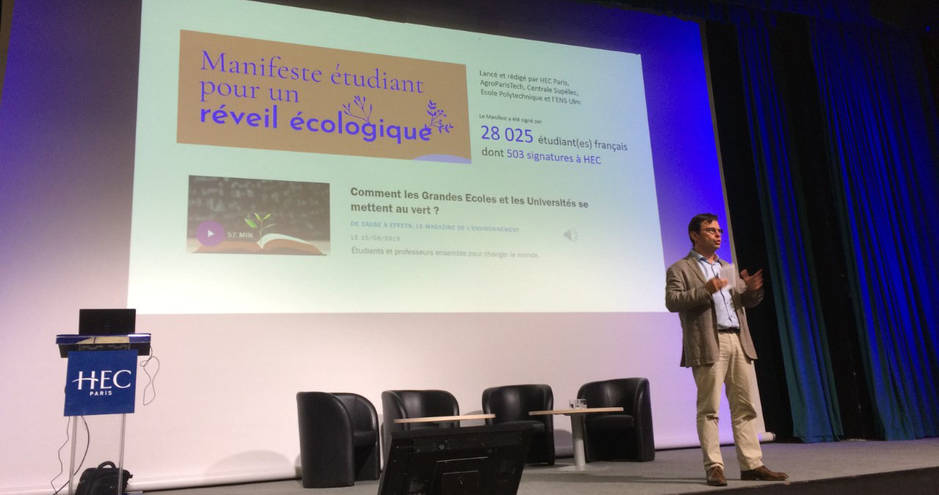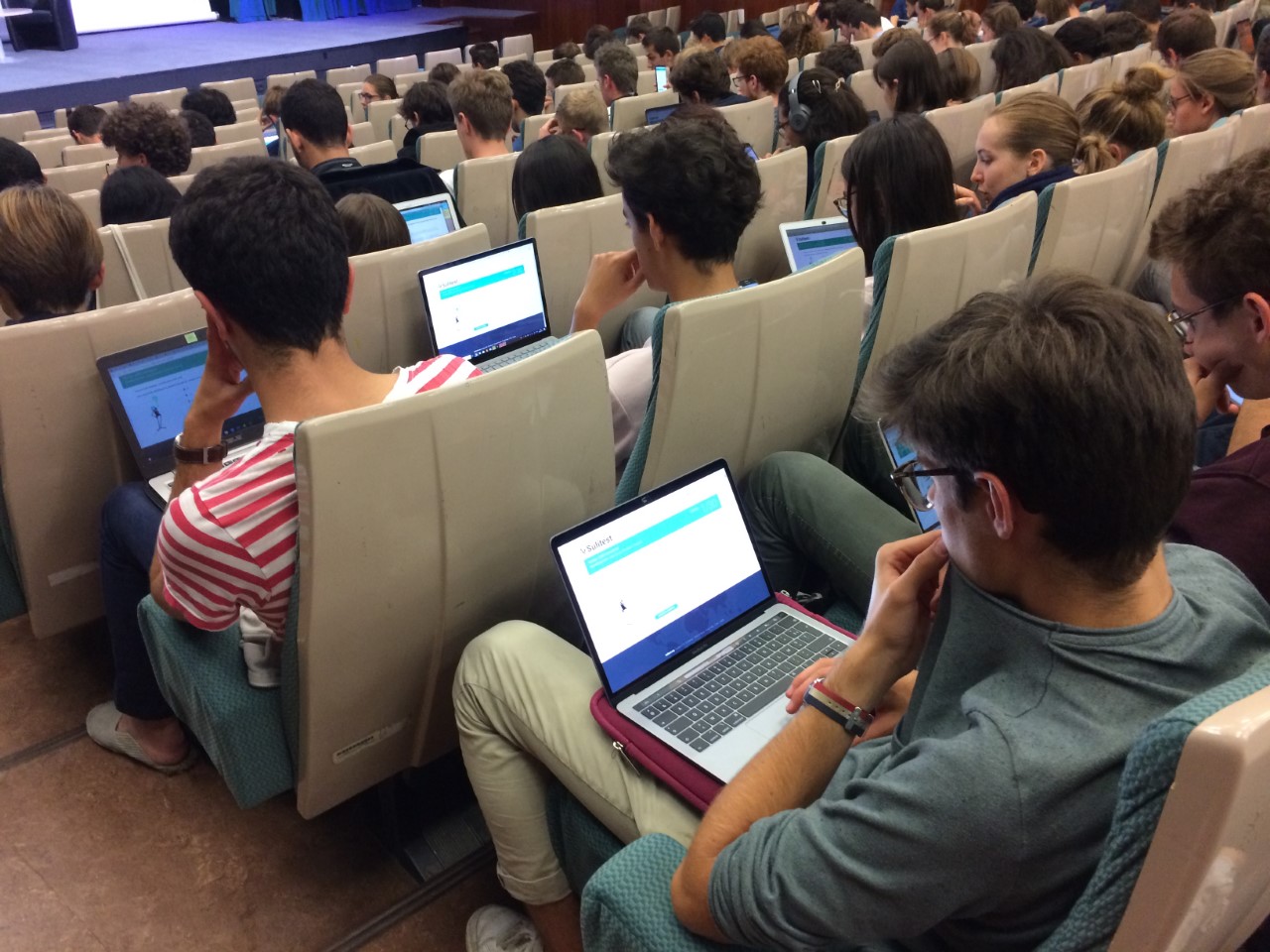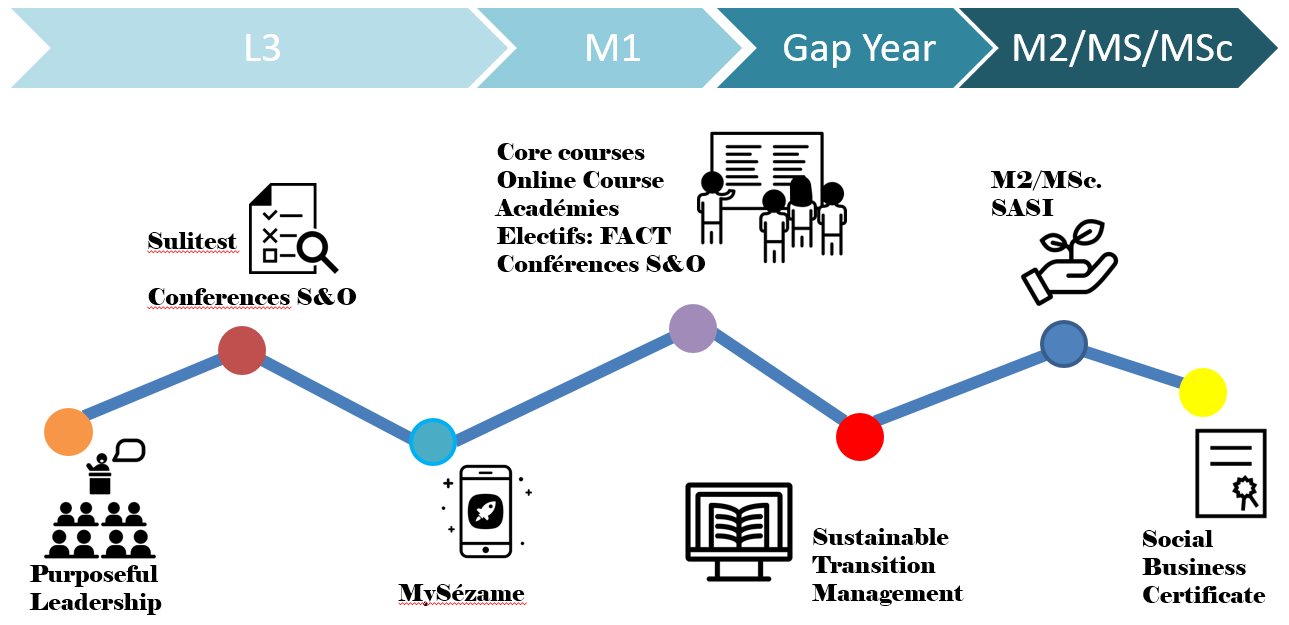A new environmentally and socially engaged learning path
Members of the Society & Organizations Center at HEC Paris recently responded to an appeal by Shift Project, aiming to ‘teach all students about climate and ecological issues’. Bénédicte Faivre-Tavignot and Rodolphe Durand take the opportunity to outline the School’s involvement, and to reveal the initiatives put in place at the beginning of this academic year.

“The call from students in their Manifesto for an Ecological Awakening has been heard. Even if responses already existed in lots of institutions, it is thanks to the mobilization of students that these responses, perhaps insufficient up until now, find themselves at the top of the agenda and thus benefit from an amplifying effect,” recalls Rodolphe Durand, professor at HEC and founder of the S&O center. The climate emergency concerns our society as a whole, including all of the organizations and individuals within it. HEC is particularly concerned by these pressing challenges, as we teach leaders and future leaders who will be confronted, both as individuals and as professionals, by these major changes.
It is sometimes forgotten, but HEC Paris was a pioneer in creating a Masters in Sustainable Development in 2003. Over the years, this program has developed and grown on a global scale, to become the MSc in Sustainability and Social Innovation. In addition, many chairs and initiatives related to environmental and social challenges have since been brought to life on the Jouy-en-Josas campus.
The next step
Today, the main challenges for the S&O Center, which has about 60 professors, are to develop research (for example on new economic models and the financing of the ecological transition) and to train HEC students on these big challenges, through the systematic integration of environmental and social issues into core classes. As Bénédicte Faivre-Tavignot, executive director of the S&O center highlights, “We believe that the ecological transition is inseparable from a social transition. We started this integration two years ago and we still need to go further, and systematize it. We are ready because there is an undeniable global emergency… The last report from GIEC is very alarming – and that’s why this year we have marked a new phase, with obligatory classes on these subjects.”

Measuring the impact of new teaching methods
To evaluate the students’ existing knowledge of these challenges, this year for the first time ever all HEC students took the Sulitest (Sustainability Literacy Test) upon their arrival at the School. The students will take it once more at the end of their studies: which will allow us to measure the impact of teaching at HEC and to ensure a minimum level of knowledge for our graduates in terms of sustainable development.
This test is an invaluable tool for the measurement and improvement of student knowledge on the fundamentals of social responsibility and sustainable development across the world. It is now a benchmark in higher education: More than 800 universities, in 66 countries, have incorporated it into their teaching. “It is a way in which we can compare ourselves to the other Grandes écoles in France and throughout the world, against the four main pillars of sustainability (see the table below), and adapt our teaching accordingly,” explains Rodolphe Durand.
In addition, students have been granted access to a new application, MySezame, centered on social and business innovation, as a more playful way to learn about how to combine business and social impact.
A new era of HEC teaching
Not limited to Sulitest and MySezame, this is a whole educational program which is now offered to 100% of Grande Ecole students. Even before their arrival on campus, the students attend a seminar on purposeful leadership and finding purpose in business and are sent to three sites (this year Mont Saint Michel, Saint-Cyr Coëtquidan, and Chamonix), to reflect on these questions of ‘raison d’être’. “This concept of "raison d’être" is also very much linked to the questions about the contribution of business towards the big challenges of today. We saw one of these challenges through our own eyes in Chamonix, global warming, with the melting of the Mer de Glace Glacier. How can a business contribute to the limitation of global warming? What role should businesses play? These are all questions that we started to address during the seminar.” stresses Bénédicte Faivre Tavignot.
In the second year, online classes in Sustainable Transition Management and optional modules are offered to students. Then in their final year specialization, they can choose to integrate the MSc Sustainability and Social Innovation or to complete their major with the Inclusive & Social Business certificate.

In addition, students have been granted access to a new application, MySezame, centered on social and business innovation, as a more playful way to learn about how to combine business and social impact.
New ways to teach new issues
The declaration of the 8000 signatories of the appeal from Shift Project, calls for more funding to be made available for the teaching of climate change issues, noting that "young people are now volunteering to play their part in the energy and ecological transition, but they will not be able to do so if their training does not give them the necessary knowledge and skills.”
The knowledge and skills that HEC has developed as part of its lessons and programs for more than 16 years are in different areas:
- Knowledge, in particular on climate mechanisms, their impacts, biodiversity
- Skills, relating to different disciplines, particularly management or related to the value chain: financing (and in particular transition financing, responsible investment), R&D (eco-design), strategy (ability to invent new business models), supply chain (circular economy, sustainable purchasing), responsible marketing (consumer empowerment)
- Mindset, related to leadership: it is a question of training determined, creative, open and attentive change makers.
“Whether it is on the side of our students, or the companies who recruit them, we must understand that there is a strong pressure to integrate these notions into our teaching.” observes Rodolphe Durand, "At HEC, with the S&O center, which is cross-curricular and where all management disciplines are represented, we have a communication channel which allows us to develop these classes. Our hope now is that we will be able to offer them to all students.”
Engaging all the stakeholders
The challenge is immense, especially when it demands changing the consumer habits of all economic parties. Of course, there are tensions between short-term approaches, which are favored by the current economic and financial system, and long-term approaches. “But businesses also have to adapt and anticipate consumer trends, and even play a role in making them aware of their social responsibility” comments Bénédicte Faivre Tavignot. “It is in this sense that we hope, for example, to be able to grow our marketing syllabus. We have already started to do so.”
As demonstrated by the S&O Center's extensive research, companies have also understood that they will not be able to attract and retain talent or motivate their employees (especially millennials) if they do not commit to climate, biodiversity and social justice. How can we imagine continuing to do business in an ecosystem if it is destroyed? This is why it is urgent to act, and why it is necessary to mobilize all stakeholders (public, private, civil society, and academics) for a real systemic change.

Pour réecouter l'émission en podcast
Know more:
Certificat Inclusive & Social Business
MSc in Sustainability and Social Innovation